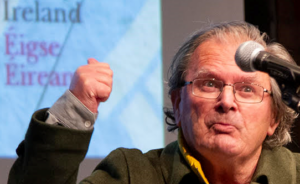Author’s Note:
From time to time, literary forums such as LitHub take a look at verse for children, that is to say they take it seriously as a literary genre – as they should. After a brief love affair with poetry, children can often leave it behind as their sense of fun, adventure, curiosity and enchantment begins to change.
https://lithub.com/what-are-the-elements-of-a-good-childrens-poem/
It’s not that they are moving away from poetry – poets for children are not keeping up with them!
Writing poetry for children and older children, in Irish and English, is not something I take lightly. In recent years, I’ve taken the ekphrastic route, namely using artwork in the Public Domain as a spring board for poems about a character called Uncle Toby.
Regular rhythm and rhyme is often a feature of poems for younger children but one could argue that older children might prefer a more irregular rhythm. One way or the other, all a poet can hope for is that the older reader (8 – 12+) will engage with the narrative, atmosphere and emotional range of the poems and not feel too “grown up” to enjoy the zany fun.
*
Toby’s Travels With a Donkey

Tadeusz Ajdukiewicz
https://artvee.com/dl/arab-and-a-donkey-at-the-wall-of-a-house/#00
I travelled far through the Middle East
With my faithful donkey, Mr Ned,
Were it not for his outrageous braying
Would I ever have crawled out of bed?
What can I say about my donkey?
The person I got him from said:
‘You’re getting a good deal here, Toby,
This donkey is very well bred.’
As I say, he was great in the morning
For dragging me out of the bed.
To be honest, he often took advantage–
He knew I was easily led.
He could really be awfully stubborn–
How often he used to play dead!
And I’d shout at him, ‘Listen, you donkey
Stop playing with my head!’
But I miss him every so often
And it’s many a tear I’ve shed
For my faithful travelling companion
The well-bred Mr Ned.
Toby the Time Traveller

Jean Béraud – Les grands boulevards https://artvee.com/dl/les-grands-boulevards/#00
Is Toby a time traveller?
Am I a time traveller too?
I once saw you, Uncle Toby
In the year 1922!
I think it was in Paris,
‘What am I doing here?’
I was gripped by something awful,
Not excitement . . . dread, or fear.
I pinched myself, ‘Where am I?
Could this- could this be real?’
And time went slithering past me
Like a slippery young eel!
Toby! Toby!
Are you a hobo? A drifter?
Toby! Toby!
Are you a shape-shifter?!
Wounded Angel

https://artvee.com/dl/mandsportraet-med-hat/#00
When Toby was a young boy
He had a friend called Mo.
They were always up to something,
Always on the go.
One day as they were fishing
On the shores of sweet Lough Bunny*
Says Mo to his buddy Toby:
‘Oh, I’m feelin’ kinda funny’!
Just then they saw an angel–
She had fallen down on her head:
‘Lord save us,’ says the poor angel,
‘Am I alive or dead?’
‘Angels don’t die!’ says Toby
And put a hanky on her brow,
Then Mo and Toby carried her
All the way to Slievenagow.
They rustled up hearty chicken soup:
‘You’ll be flyin’, says Toby, ‘soon!’
Says Mo to the wounded angel–
‘Wave to us from the moon!’
* Most Irish place names are meaningless in their Anglicised form. Lough Bunny has nothing to do with rabbits. From the Irish buinne, a torrent or flood.
A Half-Portrait of Uncle Toby

Toby’s friends got together,
‘We’re commissioning a portrait! Of you!’
‘Of me?” exclaimed Uncle Toby,
‘Ah look, half a portrait will do.’
‘Fine! That will help us with costs!
One eye then, only one ear!’
‘Leave me the right ear,’ says Toby
‘It’s the only ear that can hear . . .’
About the Author

Gabriel Rosenstock is a bilingual poet (in Irish & English), haikuist, tankaist, playwright, novelist, short story writer, essayist, translator, writer for children and champion of ‘forlorn causes’ – the phrase is Hugh MacDiarmid’s. He is a Lineage Holder of Celtic Buddhism and a member of Aosdána (the Irish academy of arts and letters). Among his awards is the Tamgha-i-Khidmat medal (Pakistan) for services to literature.
















